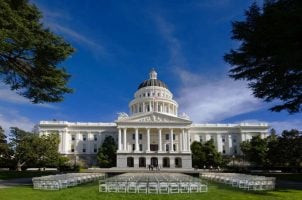California Sports Betting: Who Funds the Groups Behind the $400M Battle?
Posted on: September 14, 2022, 11:31h.
Last updated on: September 15, 2022, 04:20h.
The stakes continue to rise in the political battle to control sports betting in California. The four committees established to either support or oppose the two constitutional amendments have now raised more than $400 million between them.
A California state highway sign in San Simeon along the Pacific Coast. Four political committees tied to sports betting initiatives on the Nov. 8 ballot have raised more than $411 million, according to data from the Secretary of State’s office. (Image: Bensch511/Wikimedia Commons)And come 55 days from now, when California voters finally go to the polls, both Proposition 26 and Proposition 27 will likely go down in defeat. There’s also a smaller chance, but one not to be discounted, that voters approve both measures. That could lead to the matter going through the state’s court system, resulting in millions more being spent by stakeholders. Those will be discussions for another day.
For now, take a look look at the main players involved in the political battle and how much each has contributed to their side’s cause célèbre.
According to data from Cal-Access, a database maintained by the California Secretary of State’s office, the groups – “Coalition for Safe, Responsible Gaming;” “Taxpayers Against Special Interest Monopolies;” “Californians for Solutions to Homelessness and Mental Health Support;” and “Californians for Tribal Sovereignty and Safe Gaming” – have amassed war chests totaling nearly $411.5 million through Wednesday. That is by far the most raised for California ballot measures.
Find more about Prop 26 and Prop 27 here.
Coalition for Safe, Responsible Gaming
Total Raised: $109.5 million
Stance: Pro Prop 26 would allow retail sportsbooks at tribal casinos and state racetracks. The measure would allow tribal casinos to offer dice-based table games and roulette and allow individuals and entities to pursue legal action against operators allegedly violating state gaming laws. The coalition is also anti Prop 27, which would legalize online sports betting with proceeds for mental health services, programs to support the homeless, and some tribal economic development initiatives.
Top Contributors: Federated Band of Graton Rancheria ($30.2 million), Pechanga Band of Indians ($25.2 million), Yocha Dehe Wintun Nation ($20.2 million), Barona Band of Mission Indians ($10.3 million), and Agua Caliente Band of Cahuilla Indians ($10.3 million).
Rationale: Tribal gaming operators say limiting sports betting to brick-and-mortar sportsbooks helps ensure underage individuals won’t be able to wager. They also say Prop 26 helps tribal nations remain self-sufficient and provides an opportunity to go after illegal gaming operators. The group argues that Prop 27 would not provide adequate funding for homelessness programs since out-of-state operators would retain 90% of the profits.
Taxpayers Against Special Interest Monopolies
Total Raised: $41.9 million
Stance: Anti Prop 26
Top Contributors: California Commerce Club ($10.1 million), Hawaiian Gardens Casino ($10.1 million), Knighted Ventures ($4.1 million), Park West Casinos ($2.1 million), and The Bicycle Hotel and Casino ($2.1 million).
Rationale: Cardroom casino operators and their supporters, which include city governments and municipal worker unions, say Prop 26 would further strengthen wealthy tribal gaming operators by giving them a near monopoly on gaming. Cardrooms also fear they will be targets under the provision to go after alleged illegal operators. This could lead to cities losing millions in tax revenue if cardrooms were forced to close.
Californians for Solutions to Homelessness and Mental Health Support
Total Raised: $169.2 million
Stance: Pro Prop 27
Top Contributors: FanDuel ($35 million), DraftKings ($34.2 million), BetMGM ($25 million), Barstool Sportsbook ($25 million), and Fanatics ($25 million).
Rationale: Proponents say the measure would generate hundreds of millions of dollars in tax revenue annually to help fund programs for the homeless and support those with mental health needs. It also requires commercial operators to partner with tribal nations to get a license, allowing tribal entities to participate on their own, if they wish. The proposal also provides a funding mechanism for smaller tribes not involved in sports betting.
Californians for Tribal Sovereignty and Safe Gaming
Total Raised: $91.2 million
Stance: Anti Prop 27
Top Contributors: San Manuel Band of Mission Indians ($78.1 million), Rincon Band of Luiseno Mission Indians ($10 million), and Pala Casino Resort Spa ($3 million).
Rationale: Tribal gaming operators say online sports betting would threaten millions in revenues their casinos generate for state and local governments. They also say the online sports betting measure includes loopholes allowing those operators to reduce their tax liabilities and provide less funding for the social services programs online sports betting companies claim their measure will support.
Related News Articles
Polymarket Adds California Sports Betting Futures, Trading Banned in US
California Gov. Gavin Newsom Opposes Prop 27 Online Sports Betting Measure
Most Popular
Genovese Capo Sentenced for Illegal Gambling on Long Island
NBA Referees Expose Sports Betting Abuse Following Steve Kerr Meltdown
UPDATE: Former Resorts World & MGM Grand Prez Loses Gaming License
VEGAS MYTHS RE-BUSTED: The Traveling Welcome to Las Vegas Sign
Most Commented
-
UPDATE: Whiskey Pete’s Casino Near Las Vegas Closes
— December 20, 2024 — 32 Comments -
Caesars Virginia in Danville Now Accepting Hotel Room Reservations
— November 27, 2024 — 9 Comments -
UPDATE: Former Resorts World & MGM Grand Prez Loses Gaming License
— December 19, 2024 — 8 Comments -
FTC: Casino Resort Fees Must Be Included in Upfront Hotel Rates
— December 17, 2024 — 7 Comments
















No comments yet